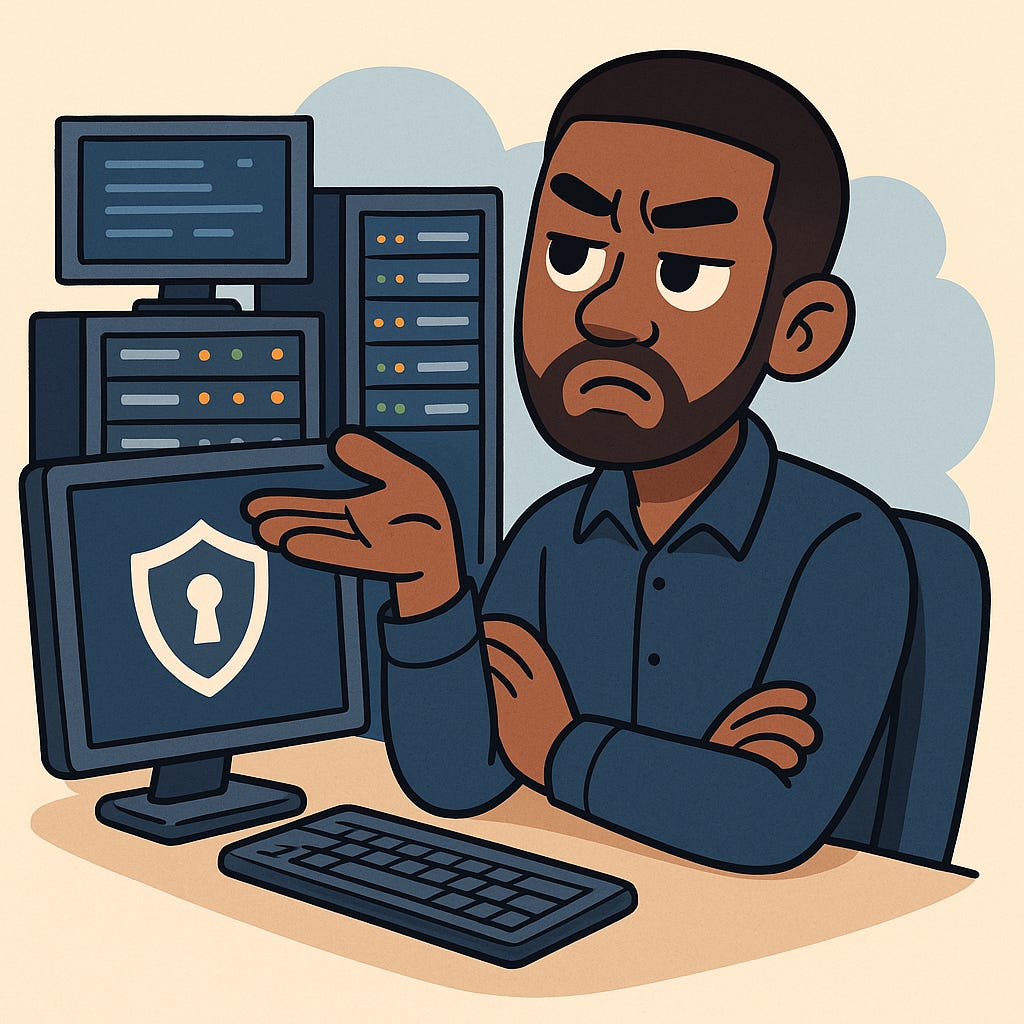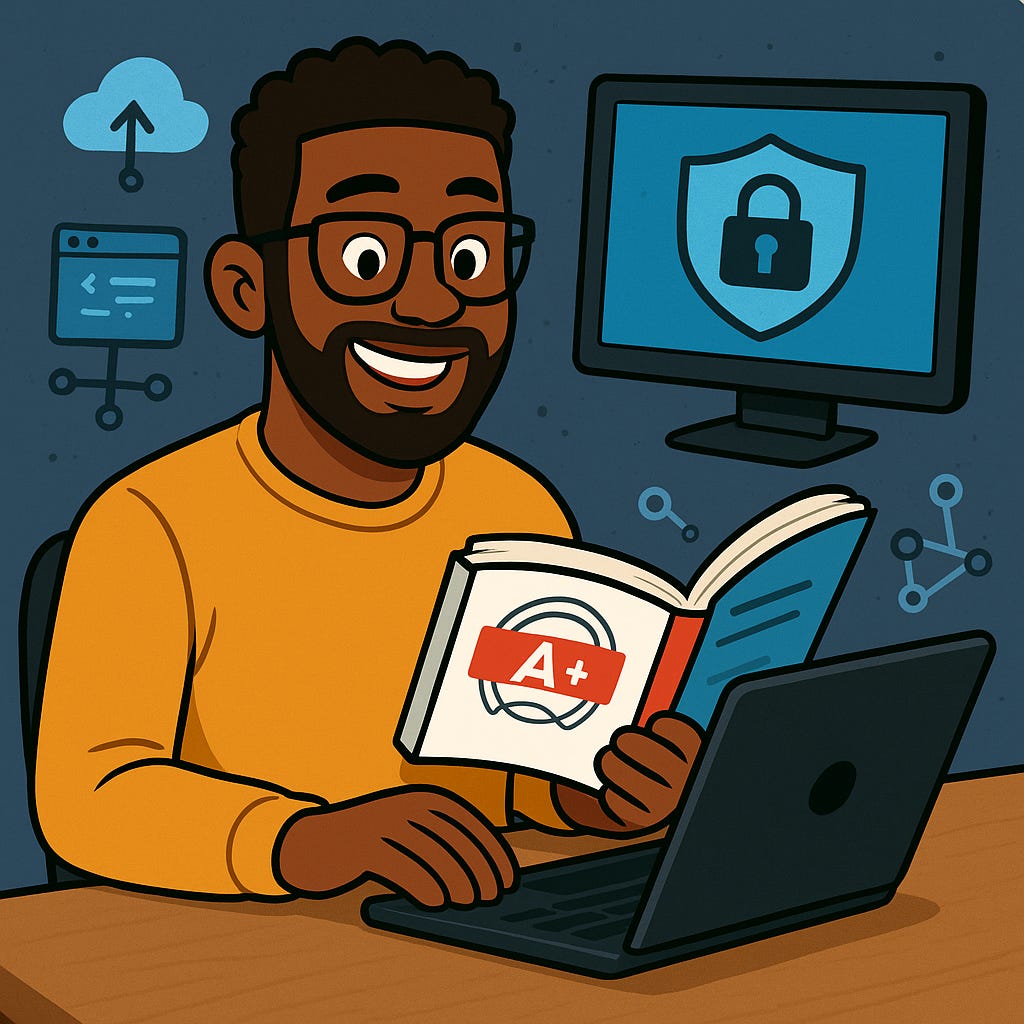Do You Really Need the CompTIA A+ to Get Into Cybersecurity?
A personal reflection on why the CompTIA A+ can help but won’t define your cybersecurity career.
If you’re trying to break into cybersecurity, especially if you’re entirely new to the field, one of the first questions you’ve probably asked is: Do I need the CompTIA A+?
I’ve been on both sides of this.
I failed the A+ twice, came back and passed, and even went on to complete the full CompTIA “trifecta” (A+, Network+, Security+).
Along the way, I discovered both the value and the limits of CompTIA A+ in a cybersecurity career.
Here’s my honest opinion based on my experience, not just what I read online.
My Perspective
When I first set out, I didn’t have any IT background.
No jobs, no internships, no professional experience. Just a freshman in college who was “tech savvy” but honestly had significant gaps in knowledge.
That’s where the CompTIA A+ became foundational for me.
It taught me the basics of hardware, software troubleshooting, virtualization, networking, and even a bit of security.
It gave me the vocabulary and confidence to start talking about IT in interviews and internships.
So yes, the CompTIA A+ was valuable as a learning tool.
It laid the groundwork for everything else: Network+, Security+, internships, and eventually, the career I have now.
Counterarguments (And Why They’re True Too)
Here’s the reality:
You don’t need the CompTIA A+ to work in cybersecurity. Employers aren’t hiring security analysts because of an A+ certification. It won’t get your resume fast-tracked for a SOC, incident response, or any cybersecurity role.
Even for IT help desk jobs, the CompTIA A+ is less recognized now than it was a decade ago. Many employers don’t care about it at all.
If you’re already technical — maybe you’ve been tinkering with computers for years, are a hobbyist home labber, or you studied CS/IT in school — the A+ will feel redundant. You could skip it and jump straight into Security+ or a cloud cert.
So while it gave me the foundation I needed, I also tell people: don’t treat it as a mandatory step.
About Me
If you're new here, I'm Day, a Cybersecurity Engineer at Amazon. With five years in cybersecurity, my experience covers Detection Engineering, Cloud Security, Incident Response, Threat Hunting, and most recently, Threat Intelligence.
Before Amazon, I worked at Datadog as a cloud threat detection engineer, where I researched cloud threats and built detections for various cloud providers and SaaS applications.
I've worked my way up from SOC analyst roles, investigating everything from endpoint threats to cloud-based abuse, so I know exactly what it takes to break into this field.
I started, just like many of you, learning from scratch, asking questions, and figuring it out one step at a time. And now, I'm here to help you do the same.
I was able to break into cybersecurity as early as my freshman year of college. I’ve secured several jobs and interviews before earning my college degree, and I’ve helped thousands of people achieve the same success on my various content channels and in my Discord Community.
Join a vibrant cybersecurity community of over 6,500 people who are constantly engaging in conversations and supporting one another, covering topics from cybersecurity and college to certifications, resume assistance, and various non-professional interests like fitness, finance, anime, and other exciting subjects.
My Advice
Here’s what I’d recommend, based on living this journey myself:
Evaluate Your Starting Point.
If you’re brand new, non-technical, or lack confidence with computers, the A+ (or at least studying its materials) is a great launchpad.
If you already know how systems, networks, and troubleshooting work, skip it and go deeper.
Study the Materials Even If You Skip the Exam.
The objectives cover core IT fundamentals every cybersecurity pro should understand.
Read through them, watch Professor Messer, check Jason Dion’s practice tests — even if you don’t sit for the test, you’ll get the knowledge.
Don’t Let Certifications Define You.
I failed the A+ twice. What made the difference wasn’t a piece of paper — it was how I learned from failure, changed my study approach, and built discipline.
In interviews, my A+ alone didn’t land me internships. Selling myself, showing curiosity, and demonstrating what I learned mattered more than the cert itself.
Use A+ as a Stepping Stone.
If you do take it, use it as a bridge to Network+ and Security+. Networking, especially, will pay dividends in security analysis and investigations.
Personal Experiences That Shaped My View
Failure is a Turning Point
My first attempts were a mess.
Studied for both Core 1 & Core 2 at the same time. Used Cisco IT Essentials instead of the actual CompTIA A+ materials. Failed twice, right before my birthday.
I wanted to quit — but my dad encouraged me to try again. That encouragement was the catalyst for everything that came next.
The Power of Fundamentals
At my internship, I once had to analyze an IP address connection during an investigation. It clicked for me that without the networking fundamentals I picked up through A+ and later Network+, I would’ve struggled.
Not Just the Cert, But the Confidence
Even when employers didn’t care about my CompTIA A+, I cared. Because I knew I could hold my own in technical conversations, and that confidence carried me into bigger opportunities.
Closing Reflection
So, do you need the CompTIA A+ to get into cybersecurity?
No.
But for the right person — especially if you’re brand new, uncertain, or starting from zero — it can be a powerful foundation.
The CompTIA A+ won’t define your career. What will define it is your willingness to learn, to adapt, to fail forward, and to keep going.
Because in this field, the certs don’t make you.
The journey does.
Stay tuned.
Cyberwox Resources on the CompTIA A+
💡 A Note of Gratitude
Before I sign off, a huge thank you to all of you who support CYBERWOX Unplugged as paid subscribers. You make it possible for me to keep creating honest, reflective content like this, rooted in my own journey.
I don’t take that support for granted.
If you’re still on the fence, consider joining. It helps sustain the work and gives you access to deeper subscriber-only posts, resources, and behind-the-scenes reflections.
This is just the beginning.
Thanks for reading Cyberwox Unplugged! This post is public, so feel free to share it.







